On the 52nd anniversary of the famous British science fiction TV series, 'Doctor Who' we look at other science fiction franchises that help popularise the genre...
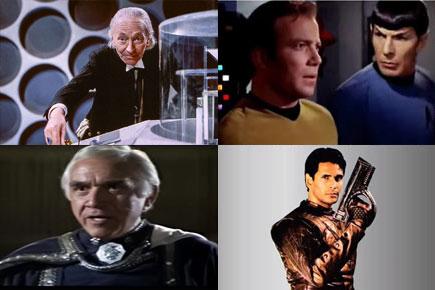
Star Trek, Doctor Who, Battlestar Galactica and Captain Vyom
Doctor Who: Perhaps one of Britain's most iconic television shows, 'Doctor Who' debuted on November 23 1963, a day after the assassination of the American President John F Kennedy. The original series, which ran till 1989, became a staple of British popular culture and also achieved success worldwide.
The story
'Doctor Who' depicts the adventures of the Doctor, a Time Lord—a time-travelling humanoid alien. He explores the universe in his TARDIS, a sentient time-travelling space ship. Its exterior appears as a blue British police box, which was a common sight in Britain in 1963 when the series first aired. Along with a succession of companions, the Doctor combats a variety of foes while working to save civilisations and help people in need.
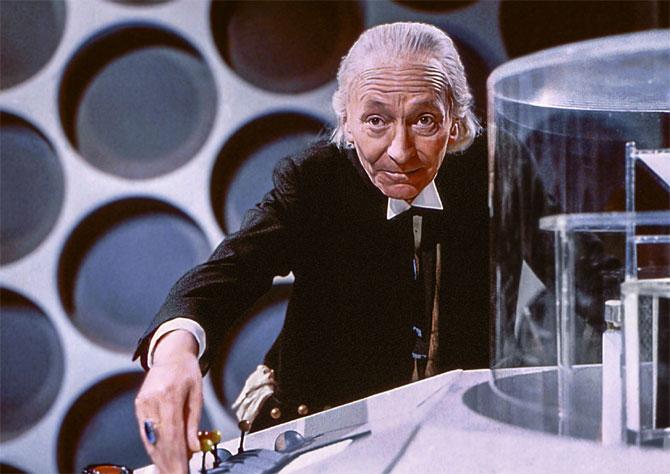
William Hartnell as the First Doctor

Peter Capaldi as his latest incarnation. Pic/YouTube
The many 'Doctors' of 'Doctor Who'
Since the character 'The Doctor' was an alien humaniod, who could regenerate himself into a different form when mortally wounded, many actors have portrayed him over the years. This was introduced by the makers to permit the recasting of the main character.
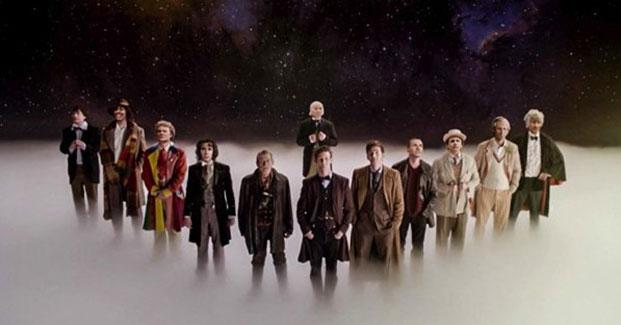
12 actors have portayed 'The Doctor', starting with William Hartnell, who essayed the First incarnation to Peter Capaldi, who is the most recent actor to portray him since December 2013.
Star Trek: The ever popular science fiction franchse 'Star Trek' began as 1966 TV series, a creation of American TV producer Gene Roddenberry. He wanted to create an action-adventure series in the vein of literary works like the 'Horatio Hornblower' novels and 'Gulliver's Travels' set in outer space.
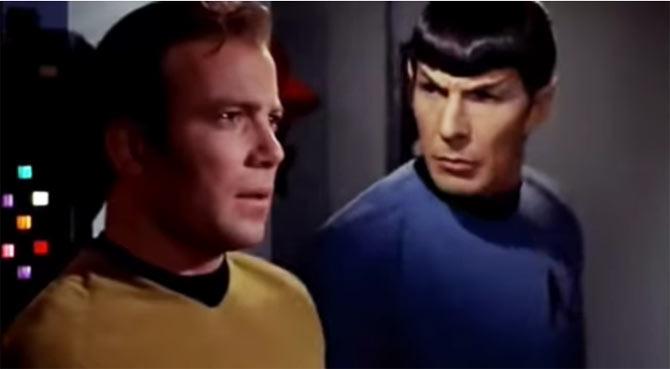
William Shatner and Leonard Nimoy as Captain James T Kirk and Mr. Spock respectively from 'Star Trek'. Pic/YouTube
Star Trek: The Original Series
First aired on followed the interstellar adventures of James T. Kirk and the crew of the starship Enterprise, an exploration vessel of a 23rd-century interstellar "United Federation of Planets". The series was responsible for actors William Shatner and Leonard Nimoy, who played Captain James T. Kirk and Spock respectively to become pop culture icons.
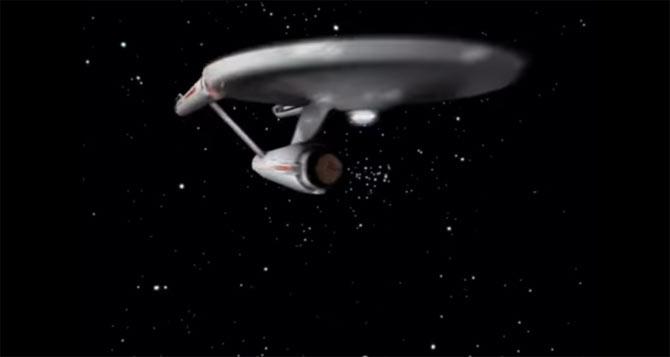
The USS Enterprise. Pic/YouTube
A list of firsts
The series was groundbreaking for the 1960s as it included a multicultural and multiracial cast. The crew of the spaceship Enterprise consisted of a a black female communications officer (Nichelle Nichols as Lt Uhura), a Japanese helmsman (George Takei as Hikaru Sulu), a Russian navigator (Walter Koenig as Pavel Chekov) and a Vulcan-Human first officer (Leonard Nimoy as Spock). While featuring a multi-ethnic cast is common nowadays, it was extremely controversial in the 1960s. Furthermore, the 'Star Trek' franchise inspired some designers of technologies, such as the Palm PDA, the handheld mobile phone and Google Earth. The concept of 'teleportation' which has become a staple on science-fiction was popularised through the show.
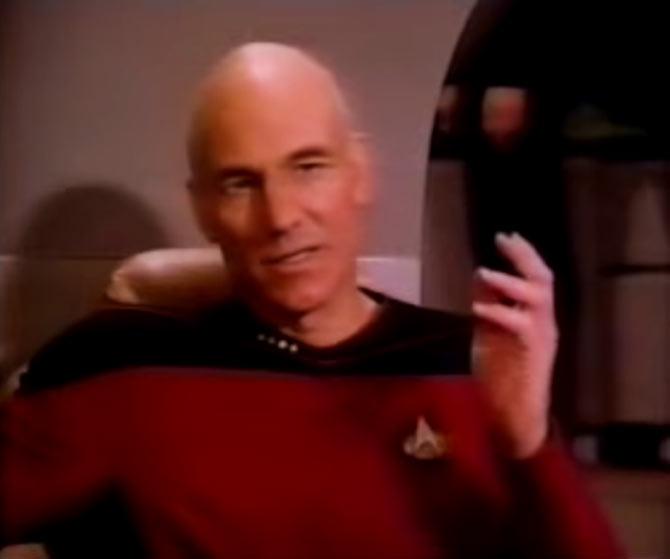
English Shakespearean actor Patrick Stewart became famous as Captain Jean Luc Picard in 'Star Trek: The Next Generation'. Stewart is also well known for his portrayal as Professor Charles X Xavier in the 'X-Men' film franchise. Pic/YouTube
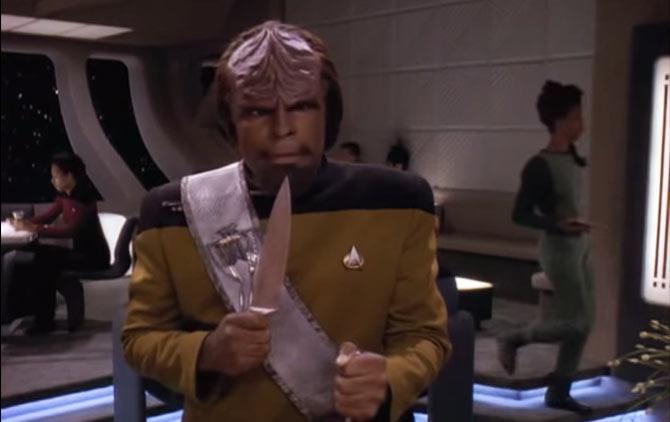
Actor Michael Dorn gained fame as the Klingon Worf on 'Star Trek: The Next Generation'. The language spoken by the alien species Klingons (also called Klingon) became so popular that it began to be used amongst 'Star Trek' fans and eventualy became recognised by the Guinness Book of Record as 'The World's Most Popular Fictional Language'. Pic/YouTube
'Star Trek' fans turn creators
The 'Star Trek' franchise enjoys a devoted fan-following to this day. Several thousand fans turned up at the first Star Trek convention which occurred on January 21–23, 1972 in New York City. Fans launched a massive letter-writing campaign to save the original 'Star Trek' series when it neared cancellation. Similar fan campaigns occured during the cancellation of 'Star Trek: Enterprise'.
Several of these above mentioned long-time fans have collaborated and produced shows, which although not officially part of the 'Star Trek' universe have received support from veteran cast members and writers of the original show. While none of these films have been created for profit, several fan productions have turned to crowdfunding from sites such as Kickstarter to help with production costs. 'Star Trek Continues', 'Star Trek: Phase II' are two of many notable fan productions.
A major media franchise
The cancellation of the original 'Star Trek' TV series led to the creation of it's spin-off, 'Star Trek: The Next Generation', which aired in 1987 and ran till 1994. English actor Patrick Stewart became popular for his portrayal as Captain Jean Luc Picard. Other characters such as the Klingon Commander Worf became pop culture icons thanks to the show. An animated series, which was created in 1973 and cancelled in 1974 proved to be unpopular with viewers. 'Star Trek: The Next Generation', was succeeded by 'Star Trek: Deep Space Nine' in 1993, 'Star Trek: Voyager' in 1995 and finally 'Star Trek: Enterprise' in 2001. 'Deep Space Nine' ran till 1999, 'Voyager' ended in 2001 and the final series in the 'Star Trek' universe so far, 'Enterprise' aired till 2005.
Apart from the above mentioned TV shows, six feature films have been made, which continued the story of the original 'Star Trek series. These were, 'Star Trek: The Motion Picture' (1979), 'Star Trek II: The Wrath of Khan' (1982), 'Star Trek III: The Search for Spock' (1984), 'Star Trek IV: The Voyage Home' (1986), 'Star Trek V: The Final Frontier' (1989) and 'Star Trek VI: The Undiscovered Country' (1991). The third and fourth 'Star Trek' films were directed by cast member Leonard Nimoy, while the series' lead star William Shatner wielded the megaphone for the sixth.
Following the cancellation of 'Star Trek: The Next Generation', four films were made to continue the storyline. These were, 'Star Trek Generations' (1994), 'Star Trek: First Contact' (1996), 'Star Trek: Insurrection' (1998) and 'Star Trek: Nemesis' (2002.
The franchise was subjected to a total reboot in 2009 with the film 'Star Trek' directed by J.J. Abrams. Abrams also directed another film 'Star Trek Into Darkness', which released in 2013. An untitled sequel is in the works, which is scheduled to release in 2016.
Furthermore, the Star Trek franchise has many novels, comic books, video games, and other materials, which are generally considered non-canon.
RUR: In what could be described as a first for television, a section from the 1921 Czech science-fiction play 'R.U.R.' written by Karel Capek, was aired on February 11 in 1938 on BBC television. This 35-minute TV adaptation is considered as the first piece of television science-fiction ever to be broadcast. The play was notable for using the term 'robot' for the first time, a word derived from the Czech word robota, which means forced labor.
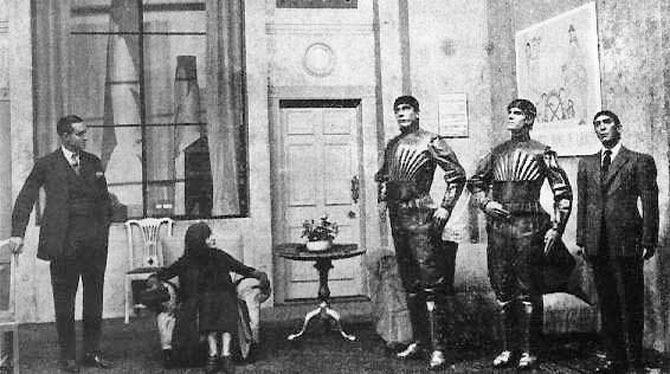
A still from R.U.R.
The story of 'R.U.R.' which stands for 'Rosumovi Univerzální Roboti', translated as 'Rossum’s Universal Robots' begins in a factory that makes artificial people, called roboti (robots), out of synthetic organic matter. These 'robots' are closer to the modern idea of cyborgs, androids or even clones, as they may be mistaken for humans and can think for themselves. Initially happy to work for humans, they turn hostile and revolt, which leads to the extinction of the human race.
Stargate: The 'Stargate' franchise originally began in 1994 as a Hollywood film, which went on to become successful worldwide. Starring Kurt Russell and James Spader it deals with the adventures of discredited Egyptologist Daniel Jackson (played by Spader) and a military team led by Colonel Jack O'Neil (played by Russell) who are ordered to step through the Stargate and identify potential military threats on the other side. The team discovers a slave civilization serving an alien who is posing as the Egyptian god Ra (Jaye Davidson).
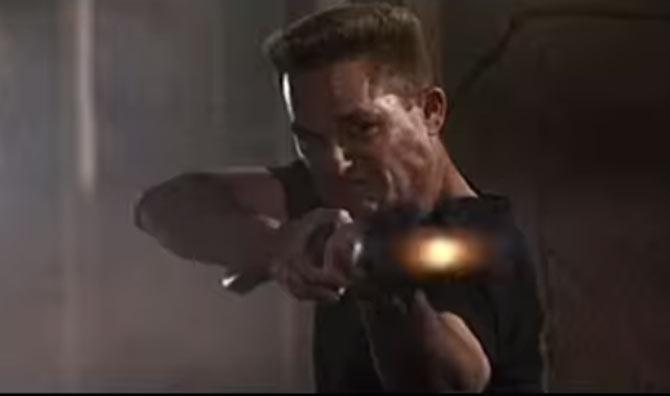
Kurt Russell and (below) James Spader in 'Stargate' (1994). Pics/YouTube
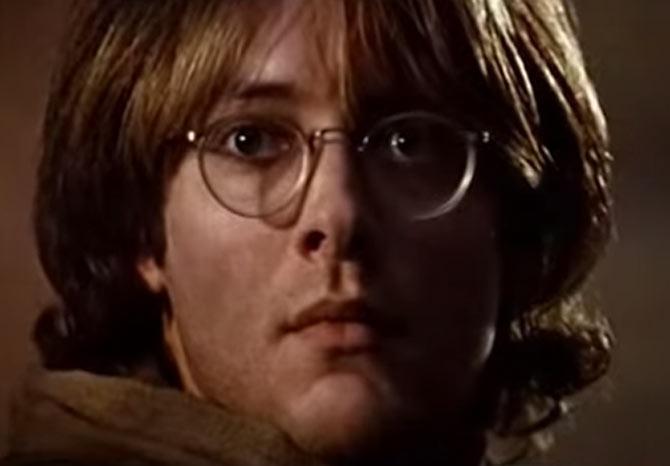
A television series titled 'Stargate SG1' was created as a sequel to the above film. All productions centre on the premise of a "Stargate", a circular device that enables instantaneous transportation to another Stargate located up to cosmic distances away. Combined with the notion that the Stargate is a secret, Stargate productions are notable for presenting no contradiction with reality, being set in the present day on an otherwise normal Earth, and being dominated by human interaction.
A major media franchise
The 'Stargate' franchise comprises of 3 feature films, 'Stargate' (1994), 'Stargate: The Ark of Truth' (2008) and 'Stargate: Continuum'; 3 live-action television shows, 'Stargate SG-1', 'Stargate Atlantis' and 'Stargate Universe' and an animated series, 'Stargate Infinity'.
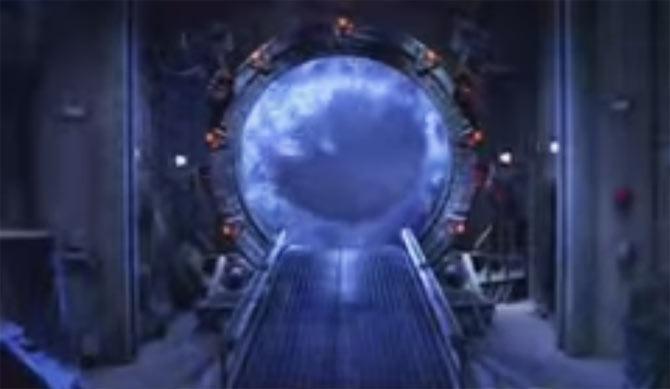
The Stargate as seen in 'Stargate SG1'. Pic/YouTube
There are three series of novels based on the Stargate franchise, one based on the original Stargate film and two based in the Stargate SG-1 and Stargate Atlantis television shows. A series of books written by Bill McCay were published from 1995 to 1999 that were unofficial sequels to the film. These were produced by consulting the original notes made by 'Stargate' creators Dean Devlin and Roland Emmerich. These were followed by multiple other novelisations and a series of comic books based on 'Stargate SG-1' and 'Stargate Atlantis'.
Besides the above there are multiple video games, trading card games and even a pinball game related to the franchise. A few notable mentions include, 'Stargate SG-1: Unleashed', 'Stargate: Resistance', 'Stargate Worlds' among many others.
Due to multiple developers working separately and independently on the franchise over the years, the various Stargate productions are not entirely consistent with each other; and while no set of works forms an official canon, the largest following exists for the three live-action series.
'Stargate SG-1' has won the Saturn Award for Best Syndicated Television Series on numerous occasions, and its cast has won similar awards for acting. More recently it has received acclaim for its visual effects, which increased in quality and realism as the show gained a larger budget. The average viewership to Stargate SG-1 and Atlantis was around 10 million a week worldwide.
Futurama: This 1999 science-fiction animated-comedy is the work of 'The Simpsons' creator Matt Groening. The show has received critical acclaim for it's satire and animation quality and has won several awards in the process. The show has been nominated for 17 Annie Awards and 12 Emmy Awards, winning seven of the former and six of the latter. It has also been nominated four times for a Writers Guild of America Award, winning two for the episodes "Godfellas" and "The Prisoner of Benda", been nominated for a Nebula Award and has received Environmental Media Awards for episodes "The Problem with Popplers" and "The Futurama Holiday Spectacular".
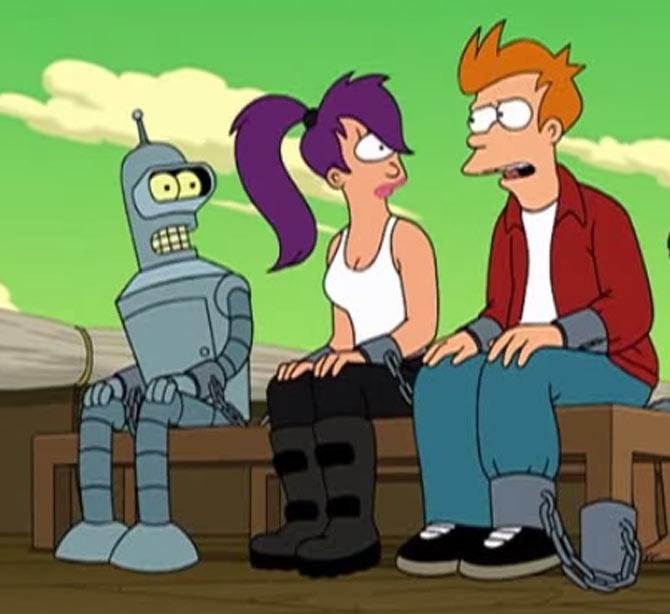
The main characters of 'Futurama' Bender, Leela and Philip J Fry. Pic/YouTube
What the show was about
'Futurama' follows the adventures of a late-20th-century New York City pizza delivery boy, Philip J. Fry, who, after being unwittingly cryogenically frozen for one thousand years, finds employment at Planet Express, an interplanetary delivery company in the retro-futuristic 31st century. Other characters on the show like Turanga Leela, the competent, one-eyed captain of the Planet Express Ship, who initially presented as an alien but is later revealed to be a a mutant from the sewers and Bender, a foul-mouthed, heavy-drinking, cigar-smoking robot became pop-culture icons due to the show's popularity.
The series
'Futurama' aired on Fox from March 28, 1999, to August 10, 2003, before ceasing production. It was revived in 2008 as four direct-to-video films; the last of which was released in early 2009. Comedy Central entered into an agreement with 20th Century Fox Television to syndicate the existing episodes and air the films as 16 new, half-hour episodes, constituting a fifth season. In June 2009, producing studio 20th Century Fox announced that Comedy Central had picked up the show for 26 new half-hour episodes, which began airing in 2010 and 2011. The show was renewed for a seventh season, with the first half airing in June 2012 and the second set for early summer 2013. It was later revealed that the seventh season would be the final season, as Comedy Central announced that they would not be commissioning any further episodes. The series finale aired on September 4, 2013, officially ending the series.
Just like 'The Simpsons', the animators of 'Futurama' blended traditional pencil-drawn 2D animation with 3D graphics making it appear visually spectacular. The show even featured a distinct and unique opening sequence to make it memorable.
Battlestar Galactica: Originally a TV series that ran from 1978 to 1979, created by prominent American TV producer and writer Glen A. Larson, 'Battlestar Galactica' later continued as a 'Galactica 1980' but it's popularity was shortlived. The story later went on a series of novels, further expanding the franchise with a reboot in 2003, beginning with a three-hour mini-series followed by a weekly series which ran from 2004–2009.
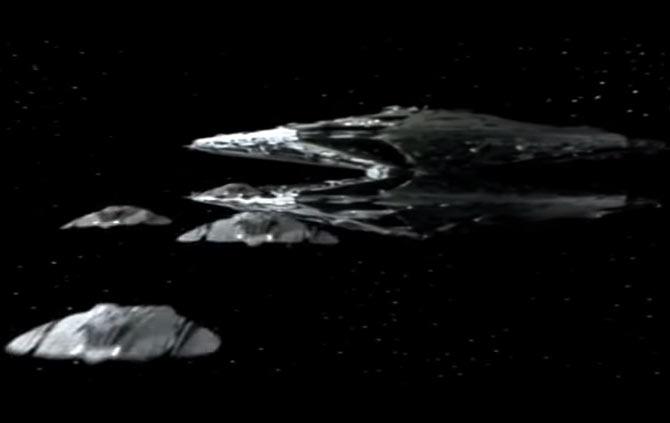
A still from the pilot movie of 'Battlestar Galactica' (1978), (below) Lorne Greene as Commander Adama. Pics/YouTube
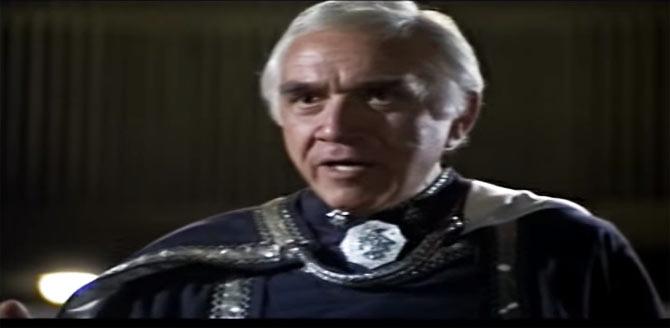
What the show was about
All productions share the premise that in a distant part of the universe, a human civilization has extended to a group of planets known as the Twelve Colonies, to which they have migrated from their ancestral homeworld of Kobol. The Twelve Colonies have been engaged in a lengthy war with a cybernetic race known as the Cylons, whose goal is the extermination of the human race. The Cylons offer peace to the humans, which proves to be a ruse. With the aid of a human named Baltar, the Cylons carry out a massive attack on the Twelve Colonies and on the Colonial Fleet of starships that protect them. These attacks devastate the Colonial Fleet, lay waste to the Colonies, and virtually destroy their populations. Scattered survivors flee into outer space aboard a ragtag array of available spaceships. Of the entire Colonial battle fleet, only the Battlestar Galactica, a gigantic battleship and spacecraft carrier, appears to have survived the Cylon attack. Under the leadership of Commander Adama, the Galactica and the pilots of "Viper fighters" lead a fugitive fleet of survivors in search of the fabled thirteenth colony known as Earth.
Captain Vyom: Model-actor Milind Soman starred as the titular 'Captain Vyom' in this sci-fi action adventure, one of the prominent programming staples of Doordarshan during Indian television's golden era. Directed by Ketan Mehta, who is noted for films such as 'Mirch Masala', 'Rang Rasiya' and many others, it could be considered a very significant attempt in the history of Indian science-fiction.
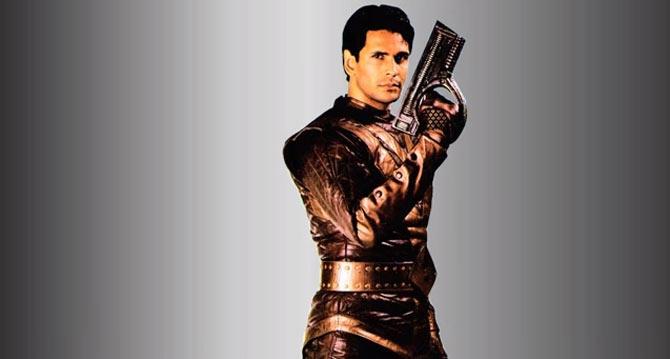
Milind Soman as 'Captain Vyom'. Pic/YouTube
What the show was about
The series followed the adventures of Captain Vyom, played by Soman and his team of seven assistants to catch 12 villians who are out to destroy planet Earth.
 Subscribe today by clicking the link and stay updated with the latest news!" Click here!
Subscribe today by clicking the link and stay updated with the latest news!" Click here!







